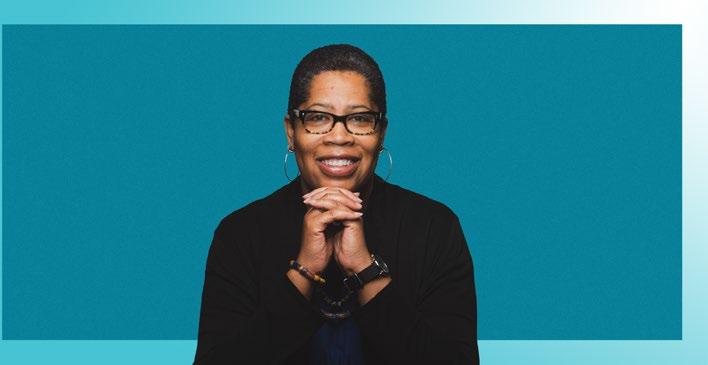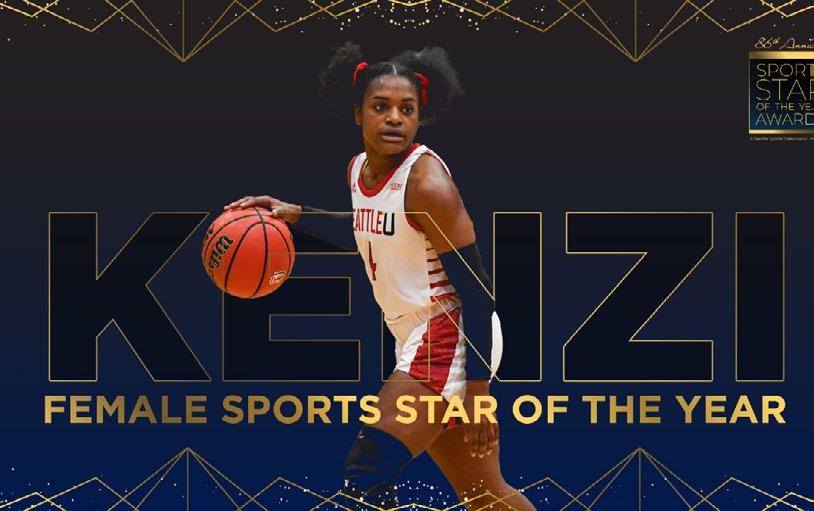
13 minute read
athletics
SPORTS STAR OF THE YEAR
Women’s basketball player recognized for superior skills and perseverance
Advertisement
You might call women’s basketball standout player McKenzi Williams, ’21, a star on and off the court. And the Seattle Sports Commission and fans alike would agree as she was selected as the 2021 Seattle Sports Commission’s Female Sports Star of the Year.
“I’m so excited to receive this award,” says Williams. “There's so much talent in Seattle that often gets underrecognized and I’m thankful for the Seattle Sports Commission for giving athletes this stage to highlight their skills. I want to thank my coaches and teammates for always having my back throughout my career. I want to thank my family, especially my mom, for supporting me and keeping me going. Thank you to my athletic trainers, Eric Raustein and Tiffany Mallick, and my strength and condition coach Jen Petersen for helping with my rehab process and allowing me to get back on the court. Thank you to the other finalists for being so talented and inspiring and thanks to the fans who voted…”
The native of Auburn, Wash., has been Seattle U’s top performer this season, ranking second in the Western Athletic Conference in scoring at 16.2 points per game. On Dec. 21, Williams set a Division I program record with 36 points at Idaho.
Williams beat out four other finalists in the fan-voting contest, as Alysha Clark (Seattle Storm), Morganne Flores (Washington softball), Charlisse Leger-Walker (Washington State basketball) and Jenn Wirth (Gonzaga basketball) were in the running. “Kenzi has been challenged throughout her young life and has shown great perseverance to overcome and succeed,” says SU Coach Suzy Barcomb. “This is a testament to her fighting spirit and belief in herself.”
Williams joins a prestigious group in Seattle U athletics history to receive a Sports Star of the Year Award, joining Johnny O’Brien (1952), Pat Lesser Harbottle (1955), Elgin Baylor (1958), Jim Whittaker (1963), Tom Gorman (1972), Bill Fenton (1973) and Stephanie Verdoia (2014).
Williams, a redshirt junior, has worked to recover from two torn ACLs in her collegiate career. She has played in 77 career games and has two years of eligibility remaining.
Seattle U student Matthew Esselstrom also took home an honor at the awards show as the recipient of the Wayne Gittinger Inspirational Youth Award.
Graphic courtesy of Seattle Sports Commission
Athletics Unveils New App
Fans of Redhawks sports teams can now stay connected even when on the go. Recently the Athletics department unveiled GoSeattleU, its official mobile app.
Powered by SIDEARM Sports, the app features real-time news alerts, schedules, exclusive multimedia content, gameday details and more. Even more, it’s free and compatible with both Apple and Android devices.
Through the app, Redhawk fans get a personalized mobile experience with breaking news and score notifications for the teams they follow, along with the ability to purchase official Seattle U merchandise and tickets. The user-friendly app will also offer links to video and audio streams of live games. digital presence,” says Director of Athletics Shaney Fink. “The app allows us to reach the Seattle U community in new and engaging ways and provides additional avenues to connect partners with the Redhawk fan base. As mobile is increasingly how people access online content, this is an important component to enhancing and expanding the Seattle U brand.”
To download the app to your smartphone or tablet, visit the App Store or Google Play and search for “Seattle U Athletics.”

WAC FAVORITES
madison cathcart, ’21
alex actonpetronotis, ’21
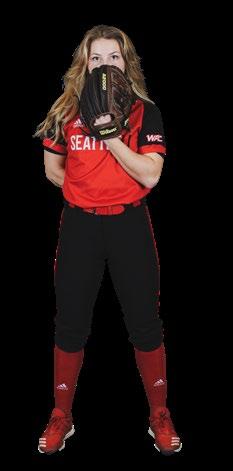
michele adam, ’23
noe meza, ’21
leahi manthei, ’21 ally choate, ’21
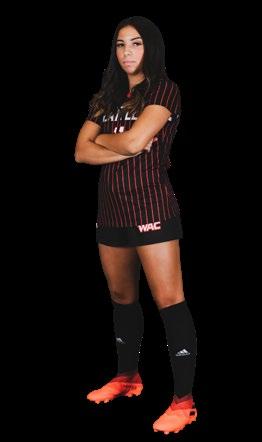
Women’s Soccer
For the seventh time in eight seasons, Seattle University women’s soccer has been voted to win the Western Athletic Conference (WAC), according to the Preseason Coaches’ Poll.
Michele Adam, ’23, has been picked Preseason Defensive Player of the Year, while Adam and Leahi Manthei, ’21, were voted Preseason All-WAC.
Seattle U earned five first-place votes and 46 points in the voting.
As a freshman, Adam started 17 games at center, earning 2019 WAC All-Freshman honors. The native of Morgan Hill, Calif., was vital to the Redhawks’ back line, helping Seattle U allow just nine goals in eight WAC contests.
Manthei was a 2019 All-WAC Second Team choice after putting up a career-high eight goals. She scored five times in eight WAC matches and then recorded the tying goal in the final five minutes of regulation in the 2019 WAC Tournament Championship. Manthei, of Gig Harbor, Wash., has 20 career goals in her three seasons as a Redhawk.
Men’s Soccer
That same poll picked Seattle U men’s soccer to win the WAC this season.
Additionally, Alex Acton-Petronotis, ’21, was chosen Preseason Defensive Player of the Year and Noe Meza, ’21, Preseason Offensive Player of the Year. Acton-Petronotis, Meza, Akili Kasim, ’22, and James Morris, ’23, have earned Preseason AllWAC honors.
The Redhawks, WAC preseason favorites in five of the last seven seasons, claimed nine of 10 possible first-place votes and 98 points. Seattle U entered the regular season with the longest active unbeaten streak in the nation (16 games).
Softball
Seattle University softball also made the favorites list. Players Madison Cathcart, ’21, and Ally Choate, ’21, were picked Preseason All-WAC. The Redhawks were voted favorites to win the WAC for the second consecutive year. The team earned four first-place votes and 32 points.
The Redhawks remain defending WAC regular-season and tournament champions from the 2019 season. They return every starter from the 2020 squad.
Learn more about these teams and players at GoSeattleU.com.
A Compassionate Hand
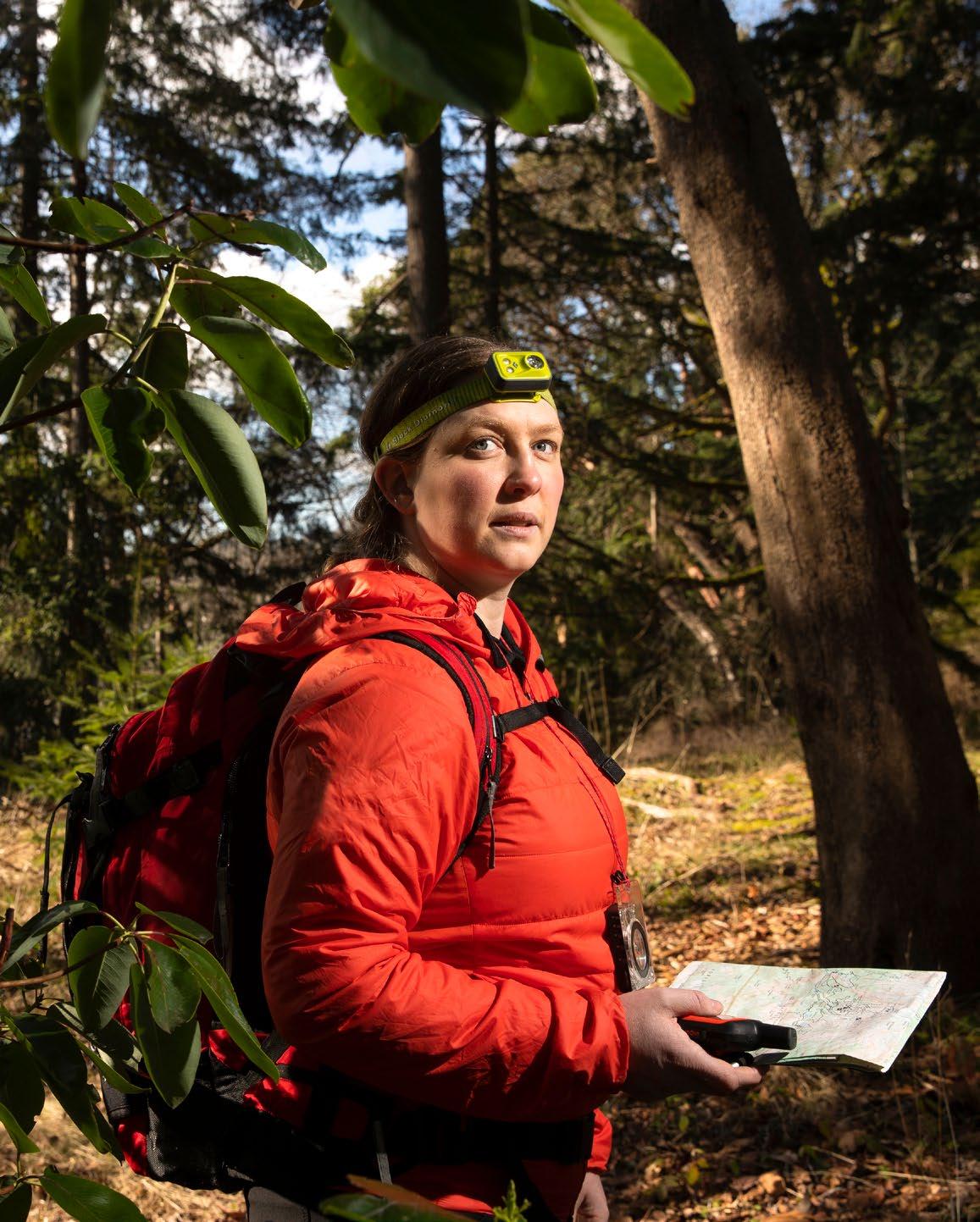
Alumna combines faith with healing as a chaplain for first responders
By Allison Nitch
In the wake of a critical incident, a chaplain, staff psychologist or clergy member typically arrives to provide mental and emotional support to first responders. But this is often not the case for those who work in remote areas.
A new nonprofit by a Seattle University alumna and former public safety officer aims to fill an important need, providing support to wilderness first responders while accessing the psychological, spiritual and emotional resources needed to survive and thrive within the demands of an often high-stress profession.
Being among the few wilderness chaplains in the Pacific Northwest, Katjarina (Katja) Hurt, ’13 MAPS, knows firsthand how frequent exposure to trauma can take a toll on the emotional and mental well-being of first responders.
A human resource consultant at the Washington State Department of Corrections, Hurt is also founder and executive director of Wilderness Chaplains. The organization was inspired by her personal experience with tragedy.
In 2018, she received devastating news that changed everything. Her friend Stephen Kornbluth fell while descending Dewey Peak in Mt. Rainier National Park and did not survive his injuries.
Local mountaineer authorities were contacted, albeit unfamiliar with critical incident stress or how to immediately support the two survivors. The authorities eventually decided to call Hurt, a rare resource for wilderness crisis response.
“They didn’t know it was my best friend who had died. I collapsed on the floor sobbing,” Hurt recalls. “… I knew I had to go into chaplain mode. God help me, I wished there was someone else who knew what needed to be done, but I didn’t know where to find another one of me.”
answering her call Hailing from Vashon Island with an innate love of the outdoors, the former ski patrol volunteer traces her life’s mission back to years earlier and a particular experience she had while working as a public safety officer at Seattle University.
During a night shift in 2009, chatter over the police scanner caught her ear. It quickly escalated to screaming and an urgent distress call describing the shooting death of Seattle Police Officer Timothy Brenton. “You could tell this burly cop was crying on the radio,” recalls Hurt, a graduate student at the time. “I thought, ‘Who goes out there and takes care of the cops? Who is there with the family of this guy who has just been killed … making sure they are okay?’”
She was struck with a realization. Rather than locating perpetrators, “I want to go out and hug all of these officers because they sound so devastated. That’s when I learned what chaplains were and found my calling.”
courageous shifts Hurt discovered Catholicism as an undergraduate student at Gonzaga University and continued her religious journey at Seattle U.
While her faith sustains her, she explains that a chaplain is a listener, rather than a preacher, and is meant to serve everyone. They “represent what is in the best interest of the other person’s heart, mind, body and soul.”
Hurt attributes her personal growth to her experience in Seattle U’s Pastoral Studies Program, which instilled in her confidence and courage.
Following graduation, Hurt earned a chaplaincy certificate and began her career in various positions within the Department of Corrections (DOC) in Missouri and later, Washington state.
In 2015, recurring exposure to traumatic and dangerous situations caught up with her. Upon noticing Hurt’s drastic change in demeanor, a supervisor suggested she apply for a curriculum designer position within the agency’s training and development unit. It led to a big career shift as she flourished in training and coaching instructors and took part in conferences and events as a guest trainer and speaker.
grieving a beloved friend After her friend’s accident, Hurt distanced herself from corrections work and began part-time employment as a behavioral health technician at Ashley House and ACES, organizations providing compassionate care for young adults, children and those with special health care needs. Helping her young clients allowed Hurt to feel other things besides grief.
“I was pretty numb from the loss of Stephen. … It was good for me to be in a position to experience strong emotions unrelated to his death.”
Hurt’s unique skillset began to get attention within the search and rescue community. Calls from all over the area rolled in—each requesting training and information about where to find chaplains specializing in wilderness incidents. From there, the inspiration to create Wilderness Chaplains emerged.
Through the guidance and support of Angels for Angels—a Seattle nonprofit that offers fiscal sponsorship to social entrepreneurs—Wilderness Chaplains launched.
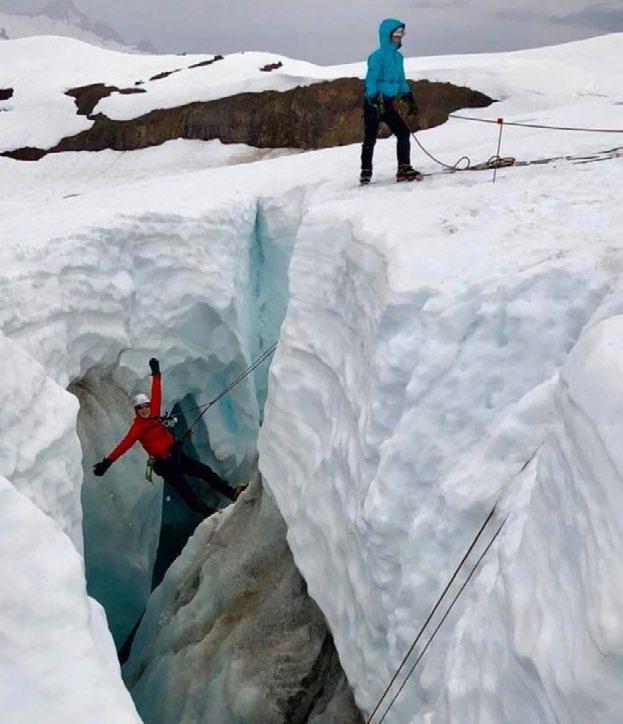
staying present
Hurt (left) and an instructor Wilderness Chaplains operates using a three-prong approach to crisis intervention: trainings (post-pandemic), presentations and support consultations. practicing crevasse rescue training on Mt. Baker with the Olympia Mountaineers. Although COVID-19 halted in-person training opportunities, the organization is offering virtual programming, expanding its network of interested chaplains through word of mouth in the field and delivering emergency guidance sessions by phone and Zoom. When responding in-person, Hurt and her team exceed all health and safety concerns by doubling up on PPE and bringing folding chairs to hold socially distant consults. In a time when consoling gestures like laying your hand on someone or giving them a hug is now considered high-risk behavior, such support only occurs on a case-by-case basis. “Part of ministry is presence. For chaplains and clergy, the notion of being the servant for God is so engrained,” says Hurt. “We sometimes forget … we can give that gift to others.” In turn, Hurt discovered a unique way to offer solace to individuals experiencing trauma: onsite coaching. While she can’t provide consoling touch during the pandemic, she can gently instruct a victim’s family or friend circle to do so effectively.
Photo courtesy of Katjarina Hurt
taking care Hurt says once someone enters the responder world, which along with wilderness rescue teams includes emergency medical technicians (EMTs), paramedics, firefighters and police, and sees how much help is truly needed, it’s difficult to turn away. At the same time, post-traumatic stress and the risk of burnout is especially high. According to the Journal of Emergency Medical Services, the people who work in these professions experience depression and suicide rates higher than those of the general public.
Hurt advises first responders seeking help to start with confidential methods, like peer support or seeking out a psychologist. If they’re uncomfortable with those options, she recommends the state’s Employee Assistance Program or a first responder crisis line.
Hurt returned to DOC due to her belief in its mission of improving public safety. “As a chaplain and through the nonprofit, I am exposed to many of different agencies and best practices, which help me bring new ideas and approaches to my work” with the state, she says.
“Having faith sustains me … There are plenty of days where I come back from something horrific or I lost my friend or have seen other people lose theirs. Naturally, you question why this happened.”
She tends to her own well-being through outdoor activities like skiing, kayaking and exploratory hikes with her dogs and establishes days where she turns her phone off while a colleague covers for her.
WILDERNESS CHAPLAINS

great reads Have a new book? Send information for review consideration to tinap@seattleu.edu.
Let Us Dream: The Path to a Better Future by Pope Francis (with Austen Ivereigh)
(Simon & Schuster: 2020)
Reviewed by Jerry Cobb, S.J.
At 150 pages, the new book by Pope Francis, Let Us Dream: The Path to a Better Future, is brief and breathtaking. Pope Francis sees our present crises as God’s invitation to change. He writes, “The basic rule of a crisis is that you don’t come out of it the same.” Although we understandably long for pre-COVID normality, Francis believes “normal times” too often foster spiritual superficiality.
This book is the opposite of superficial. In this Genesis-like moment Francis urges his readers, “Be the creators of your future.” He also names a new category of martyr for the Church—the health care workers and family members who died as a consequence of caring for COVID-19 patients.
While the effects of the pandemic are painfully obvious, Francis asks, “How will we deal with the hidden pandemics of this world, the pandemics of hunger and violence and climate change?” He believes the stage is set for us to dream a new dream and “to commit to act in our daily lives on what we have dreamed.” The book is divided into three parts. In the first, “A Time to See,” Francis asks readers to “Imagine what happens when the virus hits a refugee camp.” He identifies three obstacles to seeing what is before us—narcissism, discouragement and pessimism, which produce what he calls an “existential myopia.” He also shares three of his own personal “COVID moments,” times of serious illness, self-doubt and struggle.
In part two, “A Time to Choose,” the Pope discusses “signs of the times” such as the neglect of the elderly and the heartfelt desire of many women to exercise leadership in the Church.
Following “A Time to Choose” is the third and final “A Time to Act,” in which Francis declares the poor must have “a place at the table,” not just crumbs from the table. He explores complex issues such as capital punishment, abortion and the plight of migrants, rejecting the paradigm of “survival of the fittest.”
In an epilogue, Francis warns against longing for a pre-pandemic status quo and quotes a poem by actor and playwright Alexis Valdés that Francis received during his own time of lockdown. The poem ends with the plea, “When the storm passes / I ask you Lord, in shame / that you return us better, / as you once dreamed us.”
British journalist Austen Ivereigh provided editorial assistance on Let Us Dream, adding to the lively and clear prose. For fans of audiobooks, this version features narration by Arthur Morey, one of the most gifted audiobook actors working today. Francis’ ideas expressed in Morey’s serene voice will stimulate your mind and move your heart.
Jerry Cobb, S.J., is Assistant to the President and Associate Professor in the English Department.

